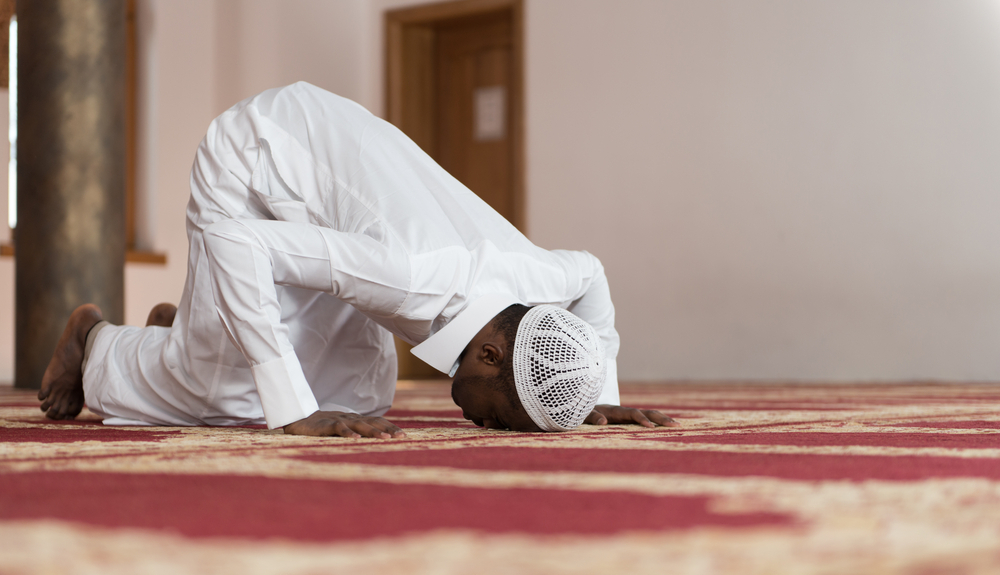When Does Laughing Break One’s Prayer in the Shafi’i School?
Shafi'i Fiqh
Answered by Shaykh Irshaad Sedick
Question
I would like to know the Shafi’i opinion on laughing in prayer. I heard it is “what is loud or when you can discern two letters.” What does this mean exactly? What would constitute “loud” if the person next to you could hear you?
What if the sound you make does not sound like an actual laugh or people would not assume it to be one, such as a voice crack, shake, etc., in which case a person next to you may be able to hear you, but they would not interpret it as a laugh. And would it matter if they made this sound after a funny thought?
What about the sound that may come when you haven’t fully laughed, but you’re trying to hold your laugh, in which you are holding your breath and making a sound?
Answer
In the Name of Allah, the Most Merciful and Compassionate. May Allah alleviate our difficulties and guide us to that which is pleasing to Him. Amin.
Intentional Sound
The prayer is invalidated (if one has no excuse) by uttering two or more letters or when two or more letters worth of sounds, such as laughter, crying, groaning, clearing the throat, blowing, sighing, or similar, are audible. [Misri, ‘Umdat al-Salik]
The consideration is two letters worth of audible sound, whether someone heard it or not, and Allah knows best.
Unintended Sounds
It is also invalidated by much (i.e., more than six words worth of) sound, even when there is a valid excuse such as blurting out words unthinkingly, laughter or coughing overcoming one, absentmindedly speaking, or when one speaks because as a new Muslim one does not know it is unlawful during the prayer; though with such an excuse a slight amount of speech does not invalidate the prayer. [ibid.]
One’s prayer is invalid if one speaks knowing that it is unlawful but ignorant of the fact that it invalidates the prayer, and it is also invalid if one says “Aah” during it out of fear of hell. [ibid.]
Clearing the Throat for Recitation
When it is impossible to recite the Fatiha (to oneself) or the final Testification of Faith (Tashahhud) or Salams) except by clearing one’s throat, one may do so even when it approximates two letters, though if it is impossible to recite aloud, one may not clear one’s throat but must instead recite to oneself. [ibid.]
Some things not commonly known to invalidate the prayer, such as clearing the throat, do not invalidate the prayer of ordinary people, whose ignorance of them is excusable. However, a scholar has no such excuse. [Keller, Reliance of the Traveler]
I pray this is of benefit and that Allah guides us all.
[Shaykh] Irshaad Sedick
Checked and Approved by Shaykh Faraz Rabbani
Shaykh Irshaad Sedick was raised in South Africa in a traditional Muslim family. He graduated from Dar al-Ulum al-Arabiyyah al-Islamiyyah in Strand, Western Cape, under the guidance of the late world-renowned scholar, Shaykh Taha Karaan.
Shaykh Irshaad received Ijaza from many luminaries of the Islamic world, including Shaykh Taha Karaan, Mawlana Yusuf Karaan, and Mawlana Abdul Hafeez Makki, among others.
He is the author of the text “The Musnad of Ahmad ibn Hanbal: A Hujjah or not?” He has served as the Director of the Discover Islam Centre and Al Jeem Foundation. For the last five years till present, he has served as the Khatib of Masjid Ar-Rashideen, Mowbray, Cape Town.
Shaykh Irshaad has thirteen years of teaching experience at some of the leading Islamic institutes in Cape Town). He is currently building an Islamic online learning and media platform called ‘Isnad Academy’ and has completed his Master’s degree in the study of Islam at the University of Johannesburg. He has a keen interest in healthy living and fitness.
